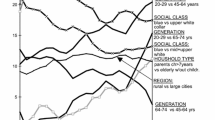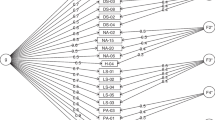Abstract
Using a new analytic approach, construct validity estimates are developed for proposed social indicators of self-reported well-being. Two separate investigations are reported: the first involves data on six aspects of well-being each assessed by six methods from 222 adults in one geographic area; the second, a partial replication and extension, involves a more limited set of indicators measured on a sample of 1297 respondents representative of all American adults.
The results provide evidence that perceptions of well-being can be measured by single questionnaire or interview items using any of four formats with validities in the range of 0.7 to 0.8 and with correlated method effects contributing less than 10% of the total variance. Two other formats, however, were markedly less valid. These findings are important in view of past criticisms of ‘subjective’ social indicators as lacking in validity, and the findings can guide current efforts to develop new ways to assess the quality of life.
Methodologically, the article illustrates the feasibility and utility of deriving parameter estimates of structural equation models of multimethod-multitrait data using Joreskog's LISREL algorithm. The possibility of deriving validity estimates in this way, even when the data include correlated errors, opens new and important opportunities to precisely assess the amount of error variance in much social science data.
Similar content being viewed by others
Bibliography
Alwin, D. F.: ·1974, ‘Approaches to the Interpretation of Relationships in the Multitrait-Multimethod Matrix’, In Sociological Methodology 1973–74 (edited by H. L. Costner), Jossey-Bass, San Francisco.
Andrews, F. M.: 1974, ‘Social Indicators of Perceived Life Quality’, Social Indicators Research 1, 279–299.
Andrews, F. M. and Withey, S. B.: 1974, ‘Developing Measures of Perceived Life Quality: Results from Several National Surveys, Social Indicators Research 1, 1–26.
Andrews, F. M. and Withey, S. B.: 1976, Social Indicators of Well-being: Americans' Perceptions of Life Quality, Plenum, New York, in press.
Blalock, H. M.Jr.: 1964, Causal Inferences in Nonexperimental Research, University of North Carolina Press, Chapel Hill.
Blalock, H. M.Jr.: 1970, ‘Estimating Measurement Error Using Multiple Indicators and Several Points in Time’, American Sociological Review 35, 101–111.
Bohrnstedt, G. W., and Carter, T. M.: 1971, ‘Robustness in regression Analysis’, in Sociological Methodology 1971 (ed. by H., Costner), Jossey-Bass, San Fransisco.
Boruch, R. F. and Wolins, L.: 1970, ‘A Procedure for estimation of Trait, Method, and Error Variance Attributable to a Measure’, Educational and Psychological Measurement 30, 547–574.
Campbell, A., Converse, P. E., and Rodgers, W. L.: 1976, The Quality of American Life: Perceptions, Evaluations and Satisfactions, Russell Sage Foundation, New York.
Campbell, D. T. and Fiske, D. W.: 1959, ‘Convergent and Discriminant Validation by the Multitrait-Multimethod Matrix’, Psychological Bulletin 56, 81–105.
Cantril, H.: 1965, The Pattern of Human Concerns, Rutgers University Press, New Brunswick, New Jersey.
Conger, A. J.: 1971, ‘Evaluation of Multimethod Factor Analysis’, Psychological Bulletin 75, 416–420.
Costner, H. L.: 1969, ‘Theory, Deduction, and Rules of Correspondence’, AmericanJournal of Sociology 75, 245–263.
Crandall, R.: 1976, ‘Validation of Self-Report Measures Using Ratings by Others’, Sociological Methods and Research, 4, 380–400.
Cronbach, L. J. and Meehl, P. E.: 1955, ‘Construct Validity in Psychological Tests’, Psychological Bulletin 52, 281–302.
Duncan, O. D.: 1966, ‘Path Analysis: Sociological Examples’, American Journal of Sociology 72, 1–16.
Executive Office of the President: Office of Management and Budget, 1973. Social Indicators, 1973. U.S. Government Printing Office, Washington D.C.
Goldberger, A.S.: 1972, ‘Structural Equation Methods in the Social Sciences’, Econometrica 40, 979–1001.
Goldberger, A. S. and Duncan, O. D. (eds.): 1973, Structural Equation Models in the Social Sciences, Seminar Press, New York.
Guilford, J. P.: 1954, Psychometric Methods (2nd ed.), McGraw-Hill, New York.
Heise, D. R. and Bohrnstedt, G. W.: 1970, ‘Validity, Invalidity, Reliability’, in American Sociological Review 34, 93–101.
Heise, D. R. and Bohrnstedt, G. W.: 1970, ‘Validity, Invalidity, Reliability’, in Sociological Methodology 1970 (ed. by E. F., Borgatta and G. W., Bohrnstedt), Jossey-Bass, San Fransisco.
Holmes, D.: 1971, ‘Conscious Self-Appraisal of Achievement Motivation: The Self-Peer Rank Method Revisited’, Journal of Consulting and Clinical Psychology 36, 23–26.
Holmes, D. and Tyler, J.: 1968, ‘Direct Versus Projective Measurement of Achievement Motivation’, Journal of Consulting and Clinical Psychology 32, 712–717.
Jackson, D. N.: 1969, ‘Multimethod Factor Analysis in the Evaluation of Convergent and Discriminant Validity’, Psychological Bulletin 72, 30–49.
Jackson, D. N.: 1971, “Comments on ‘Evaluation of Multimethod Factor Analysis’, Psychological Bulletin 75, 421–423.
Joreskog, K. G.: 1969, ‘A General Approach to Confirmatory Maximum Likelihood Factor Analysis’, Psychometrika 34, 183–202.
Joreskog, K. G.: 1970, ‘A General Method for Analysis of Covariance Structures’, Biometrika 57, 239–251.
Joreskog, K. G.: 1973, ‘A General Method for Estimating a Linear Structural Equation System’, In Structural Equation Models in the Social Sciences, (ed, by A. S., Goldberger and O. D., Duncan), Seminar Press, New York.
Joreskog, K. G. and van, Thillo, M.: 1972, LISREL: A general computer program for estimating a linear structural equation system involving multiple indicators of unmeasured variables. Unpublished research bulletin, RB-72–56, Princeton, New Jersey, Educational Testing Service, December.
Land, K. C.: 1970, ‘On the Estimation of Path Coefficients for Unmeasured Variables from Correlations among Observed Variables’, Social Forces 48, 506–511.
Wilcox, L. D., Brooks, R. M., Beal, G. M., and Klonglan, G. E.: 1972, Social Indicators and Societal Monitoring: (An Annotated Bibliography) Jossey-Bass, San Francisco.
Author information
Authors and Affiliations
Additional information
These investigations were part of a larger project titled Development and Measurement of Social Indicators which was directed by Frank M. Andrews and Stephen B. Withey and supported by the National Science Foundation through grants GS-3322 and GS-42015. A comprehensive report of the whole project is presented in Andrews and Withey, 1976. We are indebted to Marita DiLorenzi for assistance with the preparation and processing of the data presented in this article.
The second author's current address is Institute for Child Behavior and Development, University of Illinois, Champaign, Ill.61820.
Rights and permissions
About this article
Cite this article
Andrews, F.M., Crandall, R. The validity of measures of self-reported well-being. Soc Indic Res 3, 1–19 (1976). https://doi.org/10.1007/BF00286161
Received:
Issue Date:
DOI: https://doi.org/10.1007/BF00286161




